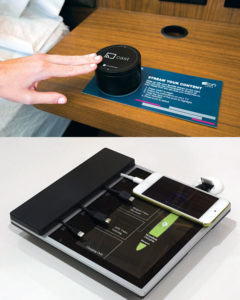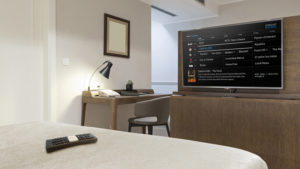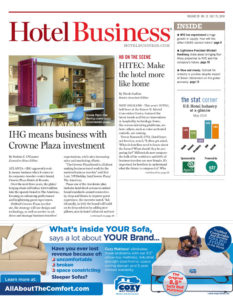NEW ORLEANS—This year’s HITEC, held here at the Ernest N. Morial Convention Center, featured the latest trends and future innovations in hospitality technology. Some, like screen mirroring platforms, are here; others, such as voice-activated controls, are coming.
Trevor Dowswell, CTO, Hotel Internet Services, noted, “I often get asked, ‘What do hoteliers need to know about the future? What should they be preparing for?’ Millennials now compose the bulk of the workforce and 60% of business travelers are now female. It’s important for hoteliers to understand what the future is composed of. Who are the people you’re going to be servicing and what are their actual needs?
“There’s a lot of talk about high-tech rooms, which is cool,” he said. “But will that result in someone staying in a hotel? Really what they want are internet and a way to connect to the TV. You have to look at making technology work smarter, not harder, and leverage the technology.”

TOP TO BOTTOM: Several companies, including TeleAdapt Limited and Bittel, have come up with screen-casting solutions for hotels.
For years, hotels have sought to figure out a way to solve the Bring Your Own Device (BYOD) problem. Guests want their own content—and they’d prefer a seamless, uncomplicated way to access that content—but the challenge was getting it to the television screen in a secure, easy manner. This year, several companies have turned to screen-mirroring solutions aimed at combating that problem. Just prior to HITEC, Sonifi Solutions launched SoniCast, a casting solution powered by Chromecast. Hotel Internet Services added new functionality to its BeyondTV solution—including the ability to directly stream cloud-based subscription content from smart devices. Also at the show was Bittel’s iMediaCast, which comes with four wired connection options that support most mobile devices, along with a wireless connectivity module that supports Miracast and Airplay. Guests can access content via their own LTE or 3/4G network or be given access to the hotel’s WiFi network. ADB also included screen casting as part of its new vuTyme platform. Additionally, TeleAdapt showcased RoomCast Powered by Chromecast, its screen-casting solution that works with Android and Apple devices. The company debuted the product at the Aloft New Orleans Downtown during the show. (Aloft has also piloted the solution at two other properties: Aloft Charlotte Ballantyne and Aloft London Excel.)
And these are just a few of the solutions that are now available. “Everybody wants to cast to the TV,” said Joe Zhang, Bittel’s CEO. “We want to make it extremely easy for the guest to use and for the hotel to install it.” He noted that a solution that doesn’t affect the hotel’s WiFi use is critical for hotels.
“It’s really across the industry, but especially brands like Aloft that really cater to the Millennials; they wanted to solve this issue of the way people watch TV. How do we get there and offer them an easy way to get those apps?” said Neil Betterton, VP, Americas, TeleAdapt Limited, noting that these solutions must be device agnostic and have the work built in so the guest doesn’t need to learn anything.
“The issue is you can’t just take Chromecast products and put them in the rooms,” he said, citing security concerns. “There are also people who don’t know much about it so they need an interface to explain it.”
Zhang stressed how important it is to make it intuitive for guests. “It’s very hard to gain their trust to use a piece of electronics in a hotel,” he said. “It has to be so simple and just work.”
Betterton noted that it’ll probably take about three years for this to become mainstream throughout the industry. “Between us and a number of other providers, it’ll get out there. The first year will be a lot of getting into the early adopter hotels. Then, even if the brand wants it [everywhere], they usually give them one to two years,” he said, noting that he’s heard of interest in screen-mirroring solutions from select-service properties all the way up to five-star.
The trend toward screen mirroring boils down to hotels looking for ways to bring the at-home entertainment experience to the guestroom—but it’s not the only way. For instance, Comcast Business announced at the show that it would pilot its X1 video platform to Comcast Business travelers for the first time in Philadelphia hotels. Traditionally a consumer product, Regan Yeldell, senior director, marketing & events, explained that the product would feel native and familiar to many guests as its what they’re used to at home—which would make it a seamless product for them in hotels.
“There are things that we have to do to make this more applicable to the hotel environment—for example, your viewing history,” she said, noting that the company is coming up with solutions to make sure that will automatically delete when a guest checks out. “There are tweaks like that which we’ll work out in our trial this summer, so the thought is, by 2017, we’ll be sales ready to roll this out across the country.”
In addition to features such as pause/rewind of live TV, free-to-guest on demand, a sports app, multiple languages and solutions for viewers with visual disabilities, X1 offers voice control: The remote features a button that lets customers instruct the TV on which channel or shows they want to watch. Reps for the company noted that this would both serve to make the system easier for guests who know exactly what they want to watch, but is also necessary in today’s Siri-connected environment.
Guestroom televisions were not the only solutions that see voice as a big part of the future. Telkonet, which offers EcoSmart, an intelligent automation platform that the company says can save up to 45% in guestroom energy reduction, displayed some of its forward-thinking technology. Not yet available, the company looked to the future of IoT capabilities, demoing versions of the system that could be controlled with either a voice or a Tweet. “Voice activation technology is no longer a party trick, but a real application that can make everyday tasks more efficient. Already available on phones and in the home, offering voice-controlled devices in a hotel room is a logical extension to enhance the guest experience,” said Jason Tienor, CEO and president, Telkonet. “Imagine having already crawled into bed and simply saying ‘Go to sleep room’ and the lights turn off, the shades close and the thermostat adjusts to a comfortable night temperature. We have made this possible through our EcoSmart intelligent automation platform of connected devices.” HB


